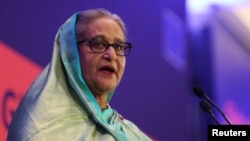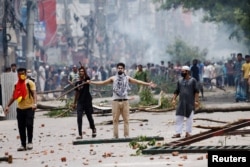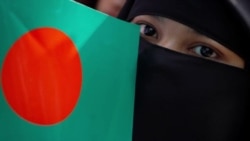The unfounded conspiracy theory that the United States orchestrated the ouster of Bangladesh’s former Prime Minister Sheikh Hasina dominates Russian disinformation narrative. The propaganda campaign involves top state officials and news media.
The narrative is nothing new: For decades, Russia has sought to discredit democratic and popular protests around the world as U.S.-fomented “color revolutions,” ignoring the reality of domestic politics and local grievances.
Commentary and analysis in Russia’s state-run Sputnik news agency repeatedly described the events that led Hasina to resign and leave Bangladesh for India on August 5 as a U.S.-led color revolution.
Critics say Hasina, once an advocate for democratic governance, had become increasingly authoritarian, securing a fourth term in office in January.
The U.S. had expressed concerns about the systematic crackdown on the opposition, critics, human rights activists and journalists, which greatly hampered the ability for Bangladesh to hold a free and fair election.
But the events that led to Hasina’s resignation began in mid-June, when student protests against a quota system for government jobs kicked off.
A preliminary U.N. report said those initially peaceful protests “reflected deeper economic frustrations among young people in Bangladesh,” punctuated by high youth unemployment.
The report noted the “democratic and civic space has become increasingly restricted in Bangladesh.”
The government responded by violently suppressing the demonstrations, leading to hundreds of deaths. That crackdown only fueled public unrest, prompting Hasina to eventually resign and flee.
Conspiracy theories, which Russian media amplified, followed.
'Resignation statement'
On August 11, India’s Economic Times newspaper reported on an undelivered speech, conveyed to it by Hasina’s “close associates.”
In that speech, Hasina allegedly said she would have “remained in power” had she “surrendered” sovereignty of Bangladesh’s Saint Martin Island and “allowed America to hold sway over the Bay of Bengal.”
On August 11, Hasina’s son Sajeeb Wazed said the alleged “resignation statement” attributed to his mother was “completely false and fabricated.”
The White House called the claim “simply false.”
Russian state-owned media Sputnik India has repeatedly used the discredited “resignation letter” to claim the U.S. toppled Hasina’s government, repeatedly failing to acknowledge Wazed’s rebuttal.
In June 2023, Hasina claimed, without evidence, that her domestic opponents and outside forces were threatening Bangladesh’s sovereignty over Saint Martin.
U.S. State Department spokesperson Matthew Miller responded that Washington had “never engaged in any conversations about taking over St. Martin’s Island.”
Nikolai Patrushev, a top aide to Russian President Vladimir Putin, also claimed that U.S. and Western allies orchestrated chaos in Bangladesh because Hasina refused to let the U.S. establish a military presence there.
Other commentary published by Sputnik alleged the U.S. “wants to turn Saint Martin into another Okinawa,” a Japanese island housing the U.S. military bases.
Because of a number of factors, including its size, location and terrain, Saint Martin is not a viable option for a U.S. naval or air base.
Tender for gas field
Sputnik India also insinuated that the U.S. orchestrated Hasina’s ouster to take control of Bangladesh’s energy resources.
In an August 18 X post, Sputnik India claimed Hasina had announced a tender for an offshore gas field Bangladesh discovered in May, attracting “interest from major U.S. firms like Exxon Mobil.”
That post, which included a GIF image of U.S. President Joe Biden, questioned whether the discovery of those resources and the resignation of Hasina were a “coincidence.”
Bangladesh did discover reserves in a state-controlled gas field in May, but a local firm is handling extraction of that gas.
The Russian speculation about connection between Exxon Mobil’s interests with Hasina’s ousting has no merit. Exxon Mobil had expressed interest in exploring energy reservoirs in the Bay of Bengal in March 2023, and in March 2024, a licensing round was announced to explore 24 oil and gas blocks.
There is no indication that process affected Hasina’s resignation.
Russian media further attempted to leverage the events in Bangladesh to sow distrust of the U.S. in India.
Sputnik India reported that intelligence is “keeping an eye on” meetings between U.S. diplomats and the opposition, even though U.S. diplomats also routinely meet with members of the ruling Bharatiya Janata Party.
India’s The Hindu newspaper reported the Indian government is concerned about repeated messages spread by Russian media, misleading the public about meetings between foreign diplomats and political figures, which it called “a legitimate part of their duty.”
Russia’s claims that the U.S. would topple Hasina’s government stretch back months.
Prior to Bangladesh’s general election on January 7, which the evidence suggests was neither free nor fair, Russian Foreign Ministry spokeswoman Maria Zakharova accused the U.S. of planning to stage an “Arab Spring” type of uprising and “further destabilize the situation,” if the outcome wasn’t to Washington’s liking.
White House national security spokesman John Kirby called the allegation“classic Russian propaganda.”







